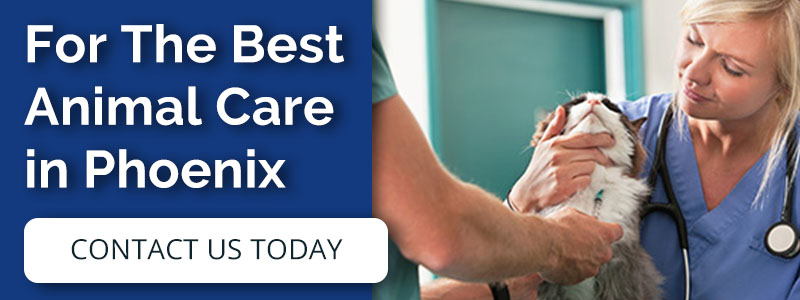How to Help Your Pet After Surgery
Surgery can be a tough thing to bounce back from. Even a simple surgery can take a few days to recover from. While humans understand that they need to rest and follow precautions after a surgery, your pet will not understand. For example, your dog may want to go for a walk after getting major surgery on their hips or legs, but that is obviously not the wisest choice.
Understanding how to help your pet recover from a surgery can help make the process simpler for you and your furry friend. At Paradise Point Animal Hospital in Phoenix, not only do we offer veterinary surgical procedures but we also offer a variety of rehabilitation services to help your pet bounce back and heal properly. From common surgeries like spay and neutering to specialized surgeries and orthopedic surgeries that are performed by a visiting veterinarian or Board Certified surgeon, we can help give your pet the care they need.
In this blog, we wanted to talk about what you can do to help your pet after their surgery. Read on and be sure to learn more about our rehabilitation services!
Keep a Medication Schedule
It is important to follow your pet’s pain medication requirements after surgery. Their medication can help to manage pain after the surgery, which will not only make your pet feel better, but also help them heal quicker. Depending on your pet’s surgery, they may be prescribed a few different pain medications, or even medication for anxiety and antibiotics. While some people choose to not take pain meds after surgery, we encourage you to not do this to your pet. You can help make them feel better by following their medication requirements and could help protect them from infection. Make sure to follow the vet’s directions with their medication, it will help the healing process go much more smoothly.
Make Them Wear The Cone
We know, pets do not like the “cone of shame” but it is essential to keep your pets from licking their incisions. If you do not make your dog or cat wear the cone, also known as an E-collar, they may end up licking their wounds, which could reopen the incision or cause infection. If you want to help your pet heal quickly with little to no issues, you will make them wear the cone; the little bit of discomfort that they may experience with the cone is nothing compared to an infection or re-opened wound. Luckily, they will only have to wear the E-collar for about two weeks after surgery.
Keep An Eye On The Incision
While you will likely not have to clean the incision at all, it is important that you keep an eye on it to ensure that it doesn’t get inf ected and that it is healing properly. You can help keep the incision clean by covering it when your pet goes outside, but you should not leave a bandage on it at all times unless the vet tells you to do so. Bandages can potentially cause more issues than good if left on. They can slow the healing process and cause sores. If you notice that the incision is crusty or dirty, you can gently clean it with a towel and warm water. Just pat it or gently wipe it. If you notice that the incision looks infected, be sure to call your vet so you can get the problem taken care of before it gets worse.
ected and that it is healing properly. You can help keep the incision clean by covering it when your pet goes outside, but you should not leave a bandage on it at all times unless the vet tells you to do so. Bandages can potentially cause more issues than good if left on. They can slow the healing process and cause sores. If you notice that the incision is crusty or dirty, you can gently clean it with a towel and warm water. Just pat it or gently wipe it. If you notice that the incision looks infected, be sure to call your vet so you can get the problem taken care of before it gets worse.
Limit Activity
We know that this can seem impossible for some pets, but it is important and can help them heal quicker. To keep your pet from being too active, you may have to create a small space for them. Confine them to a space with carpet or their bed and no furniture that they can jump on. You will want the space to be small enough that they can’t run around the house or roam and they should not have access to any stairs. If your dog is crate trained, this is a great place to keep them while they heal. For cats, you can put their litter box in the confined space. Dogs should be kept on a leash when brought outside to use the bathroom. We know that it can be hard to limit activity, but do the best you can. It’ll help the healing process go smoother and ensure that they heal properly.
Give Them Love
Your pet will need extra love and attention after their surgery, especially since they suddenly aren’t allowed to do things they love. Your pet may even be anxious after their surgery. If you notice your pet pacing, panting, whining, and showing any other signs of discomfort, they may be trying to tell you that they are anxious or in pain. Be sure to give them extra love and keep them close by. When you are home, keep them with the family so that they feel some sort of comfort. If you have to leave them home alone, you can keep them in their confined area and turn the TV on or music on quietly to help sooth them. You can also get them toys that help stimulate their mind without the need to be active. Puzzle toys or toys that you stick treats inside can keep your pet busy and happy for a while. During their time of healing, just be sure to shower them with more love than usual (we know, how is that even possible?), it will help keep them happier and more comfortable.
Check Out Rehab Options
Rehab is a great option after your pet’s incisions have healed and they are ready to slowly start getting back to their regular routine. At Paradise Point, we offer hydrotherapy, cold laser therapy, acupuncture, and traditional Chinese medicine options that can help your pet through their rehabilitation. We will be able to help you find the right rehab option for your pet and the surgery they received.
If you have questions about our rehabilitation services or our surgery services, please feel free to contact us today! We know your pets matter to you, which is why we offer great services to help them feel their best and live a happy and healthy life.




